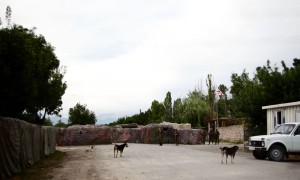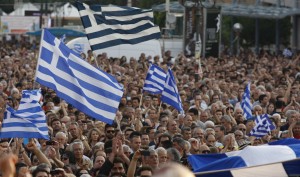Over dinner at a Kyiv restaurant, Oksana, a Ukrainian journalist remarks, in Russian, that if she ever had to visit Moscow, she would address people in Ukrainian.
At another gathering, Yulia, a visiting Russian, innocently suggests to Anna, a gallery manager, that it might be useful to have two passports – one Ukrainian and a second Russian. The angry response is a snap lesson in Ukrainian nationalism.
Over at the white columned Ukrainian foreign ministry, when the VOA camera is turned off, a Ukrainian diplomat turns on his Russian counterparts, calling them condescending, bullying, and trapped in the past. The way Russians try to sell a customs union, he says, is to spell out the economic punishments if Ukraine does not join. No mention of the upside.
On Wednesday August 24, Ukraine marks 20 years of independence.
Since 1991, this Central European country almost the size of France has been through plenty of economic and political zig zags.
In the latest political zig, Yulia Tymoshenko, the candidate who lost last year’s presidential election, is now sitting in jail, and, reportedly, suffering from declining health.
In the latest economic zag, Ukraine has recorded 5 percent growth during the first seven months of this year, well above oil rich Russia’s growth rate of 3.9 percent for the same period.
Despite the zig zags, one trend is consistent: the growth of national identity and the generalized acceptance by Ukrainians of their nation. This month, 93 percent of respondents to a poll conducted by the Research & Branding Group said they consider their homeland to be Ukraine.
Much the way that Canadian identity is forged by comparisons to the United States, Ukrainian identity is forged in opposition to Russia.
“What is Russification and Why Does it Lead to Poverty?” headlines a recent cover story in Ukrainian Week.
The satirical cover photo seems to portray the Gopnik family from the mythical — and backward — nation of Lower Slobbovia.
There is Dad, watching TV, grimly clutching Pravda. Behind him stands Daughter, smoking a cigarette, clearly on the road to teenage pregnancy. Next to her is Son, a bullet-headed guy who joyously grips a big bottle of beer. Also seated on the couch is Junior, a precocious two-year-old who already has learned a well-known rude finger gesture. In the middle is Mom, whose frozen smile might indicate she is taking large quantities of tranquilizers.
Inside, the Ukrainian Week authors walk readers through “The Anatomy of Russification” – economic, cultural and socio-political. To illustrate economic Russification, readers are treated to a photo of a stooped old woman in a Slavic shawl trudging past a shiny black Mercedes.
At one stage in my reporting career, I covered Canada. There are intriguing parallels between the Ukraine/Russia relationship and the U.S./Canada one. Both country pairs were once the same entity, sharing the same legal systems and dominant languages. Eventually, the pairs went their separate ways.
Today, United States has nine times the population of Canada. Russia has only three times the population of Ukraine.
Few (sane) people in Washington talk about a US-Canada merger. In fact, to the chagrin of some Canadians, few Americans obsess or think about Canada at all. Many Americans are probably only dimly aware that present day Canada and the United States were all part of the British Empire, until recognition of American independence in 1783.
But Russians have a different, more complicated relationship with Ukraine, a name that is often translated by Russians to mean ‘borderland.’ The forerunner of modern Russia was the Kievan Rus, an Eastern Slavic principality that adopted Orthodox Christianity in 988. For many Russians, the concept of an independent Ukraine is unnatural. How can the mother declare independence from her big, handsome son?
Moscow thought it had finally scored in Kyiv when their candidate , “pro-Russian” Viktor Yanukovych, was elected president last year.
But after 18 months in office, President Yanukovych has made it clear that his ambition is not to return to the czarist days when he would be ‘Governor’ of “Malaya Rossiya” – Little Russia. Similarly, Ukraine’s oligarchs don’t want to be demoted to be managers of subsidiaries reporting to Moscow.
In recent months, Moscow has proposed taking over Ukraine’s aviation, nuclear, and gas transmission companies. The Kremlin keeps proposing that Russia’s Gazprom merge with Ukraine’s Naftogaz. In Kyiv, people compare that proposal to a supermarket “merging” with a kiosk.
At least four times in the last year (I have lost count), Russia’s leaders have publicly invited Ukraine to join a customs union with Russia, Belarus and Kazakhstan. Some Ukrainians call this Soviet Union Lite. Two weeks ago, Ukraine’s President flew to Sochi to meet with his Russian counterpart, Dmitri Medvedev. Once again, the Russians invited the Ukrainians to join the customs union.
President Yanukovych’s public response came Friday in an interview with Dzerkalo Tizhnaya magazine.
“The time will come, and in another 10 years or so, (when) Ukraine will be part of the European Union,” the president said in an interview timed to coincide with the nation’s 20th Independence Day celebrations. “We have firmly decided our future. The choice of Europe has become the basis of Ukraine’s foreign policy identity.”
I wonder when Moscow will get it.































